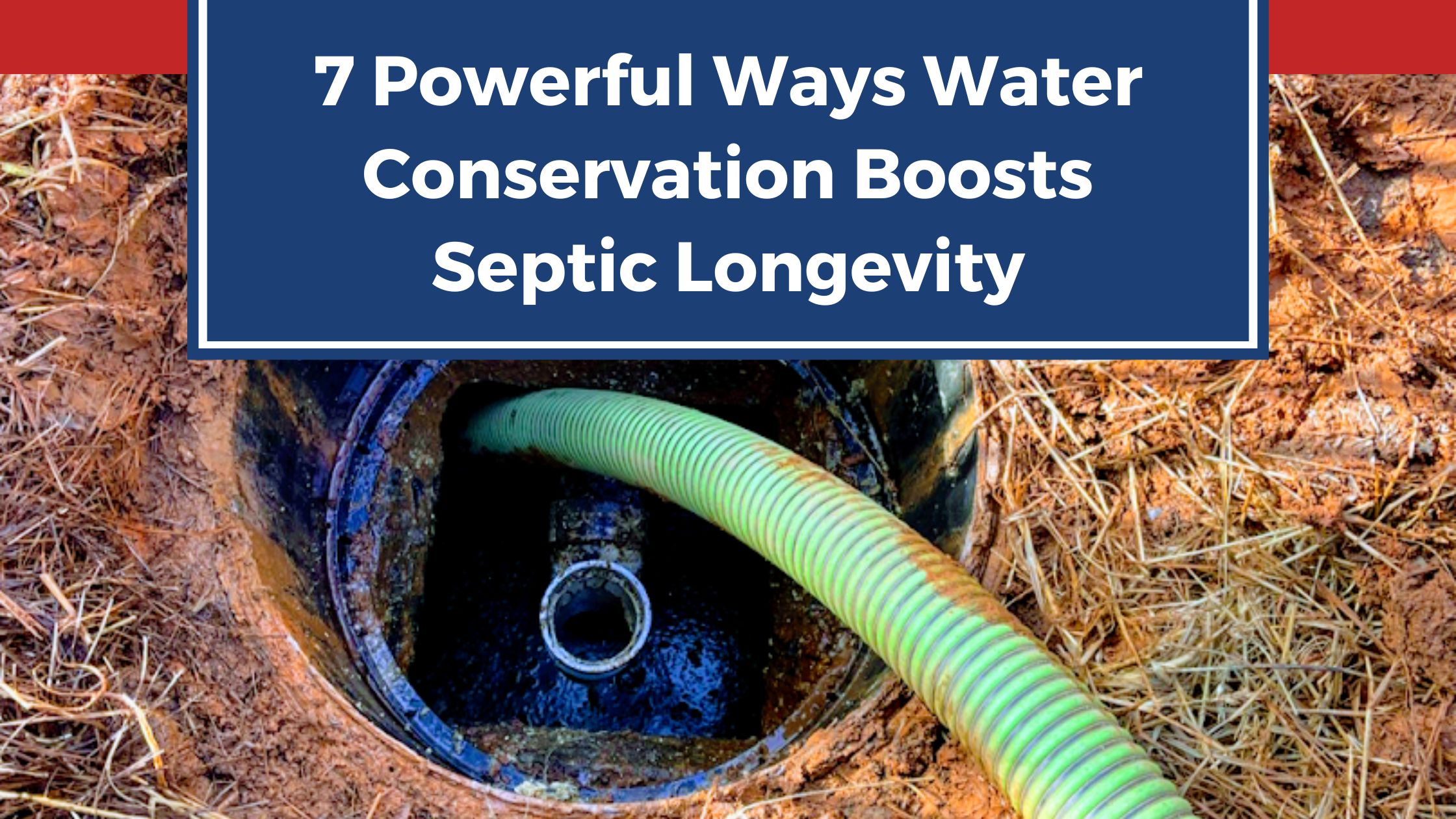7 Powerful Ways Water Conservation Boosts Septic Longevity
If you’re a homeowner with a septic system, there’s one simple habit that can significantly increase its lifespan while also protecting your wallet: water conservation. While most people associate water conservation with lower utility bills or environmental responsibility, the benefits go far beyond that—especially when it comes to your home’s septic system.
In this blog, we’ll break down how conserving water directly improves septic system performance and longevity. We’ll also share actionable tips you can start using today, commonly asked questions, and a clear path for getting expert help when you need it.
Why Water Usage Matters to Your Septic System
Your septic system is designed to treat and dispose of a specific amount of wastewater daily. When too much water flows into the system, it doesn’t have enough time to separate solids from liquids or allow proper treatment in the drain field. This can cause:
- Premature system failure
- Drain field saturation
- Costly backups or overflows
- Frequent need for pumping
By simply reducing water use, you can ease the load on your system, helping it function more efficiently and last significantly longer.
1. Reduces Hydraulic Overload on the Tank
The average septic system is built to process 50–75 gallons of wastewater per person, per day. When you use water excessively, especially in short bursts (like laundry day marathons or long showers), you overwhelm the septic tank and risk pushing solids into the drain field before they’ve had time to settle.
Water conservation tip: Spread out water-heavy activities like washing clothes and running the dishwasher. This helps prevent sudden surges that strain your system.
2. Extends Drain Field Life
Your drain field is arguably the most sensitive part of your septic system. It relies on dry soil to absorb and naturally filter wastewater. Constant saturation from overuse prevents proper filtration, eventually clogging the field and leading to total system failure.
Water conservation tip: Fix leaks promptly. A single dripping faucet can waste hundreds of gallons monthly, and that water still ends up in your septic system.
3. Reduces Frequency of Pumping
The more wastewater entering your septic tank, the more frequently it needs to be pumped. Reducing water usage lowers the level of scum and sludge buildup, extending the time between professional pump-outs.
Water conservation tip: Install water-efficient fixtures such as low-flow toilets and showerheads. These devices can cut household water use by 30% or more.
4. Prevents Septic Backups
Backups aren’t just messy—they’re expensive and hazardous. When your system is overloaded with water, untreated waste can flow back into your home through drains, leading to health risks and costly cleanup.
Water conservation tip: Avoid doing multiple high-water-use tasks at once (like showering while running a load of laundry). This balances the inflow into your tank.
5. Improves Bacterial Balance
Beneficial bacteria are the unsung heroes of your septic system, breaking down solid waste in the tank. Overwhelming the system with water can dilute and wash away these bacteria, making the system less effective.
Water conservation tip: Use septic-safe cleaners and limit antibacterial products, which kill off helpful microbes.
6. Minimizes Risk of Soil Contamination
When a drain field fails due to excessive water load, untreated wastewater can rise to the surface or leak into surrounding soil and groundwater, causing serious contamination issues.
Water conservation tip: Divert roof and surface runoff away from the drain field. Extra water from outside your home should never enter the septic system area.
7. Saves You Thousands in Repairs and Replacements
The average cost to replace a septic system in Georgia ranges from $6,000 to $15,000—or more. Proper water conservation and routine maintenance are small steps that can save you massive expenses down the road.
Water conservation tip: Educate your household about septic-safe habits. Even small daily changes can make a huge long-term impact.
How Much Water Should You Use?
Here’s a quick breakdown of optimal water use in a septic-friendly home:
Household Size | Max Daily Water Use | Recommended Gallons/Day |
2 people | 150 gallons | 100–120 gallons |
4 people | 300 gallons | 200–250 gallons |
6 people | 450 gallons | 300–375 gallons |
Using more than these recommended levels puts your system at risk. If you’re consistently going over, it’s time to implement conservation strategies or call a professional for an assessment.
High-Impact Water Conservation Upgrades
If you’re serious about long-term septic system health, consider these upgrades:
- Dual-flush or low-flow toilets – Save up to 50% per flush
- High-efficiency washing machines – Use up to 50% less water
- Smart irrigation systems – Prevent unnecessary yard watering
- Aerators for faucets – Reduce water flow without affecting pressure
Each of these changes not only conserves water but also directly reduces the stress on your septic system.
Septic Maintenance and Water Conservation Go Hand in Hand
Even the best water-saving habits can’t replace professional septic care. If your system hasn’t been inspected or pumped in the last 3–5 years, water conservation alone won’t prevent problems. Preventive maintenance is your first line of defense.
Frequently Asked Questions (FAQs)
Q: Can too much laundry ruin my septic system?
A: Yes. Doing multiple loads in a single day can flood your septic tank and push solids into the drain field. Space out laundry over several days when possible.
Q: Do water-efficient toilets really help?
A: Absolutely. Older toilets can use up to 6 gallons per flush, while newer models use just 1.28 gallons or less—reducing daily water usage dramatically.
Q: What happens if I ignore water conservation?
A: You risk overloading the tank, damaging the drain field, creating backups, and shortening your system’s lifespan. Long-term neglect can lead to expensive repairs.
Q: How can I tell if I’m using too much water?
A: Signs include slow drains, gurgling sounds, or water pooling in the yard near the drain field. A septic inspection can confirm whether your water use is affecting the system.
Q: Is gray water from showers and sinks still harmful to the septic system?
A: Yes. Even though it’s not as dirty as toilet water, gray water still carries bacteria, chemicals, and solids that affect the system’s performance if overused.
Contact Us for Septic System Care and Water-Saving Advice
If you’re concerned about your septic system or want to learn more about effective water conservation strategies, One Way Septic is here to help. Located in Acworth, Georgia, we specialize in providing reliable septic services tailored to the unique challenges of our region. Contact us by phone at (404) 775-1164, or visit our website to request a service or consultation. Our expert team is ready to assist you with inspections, maintenance, and water-saving solutions to keep your system running smoothly for years to come.




